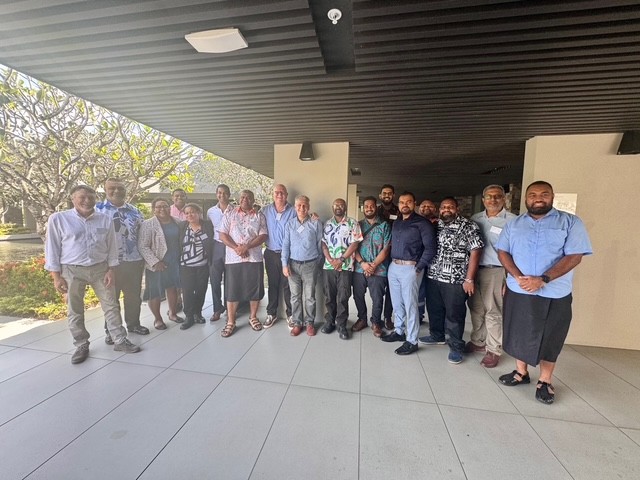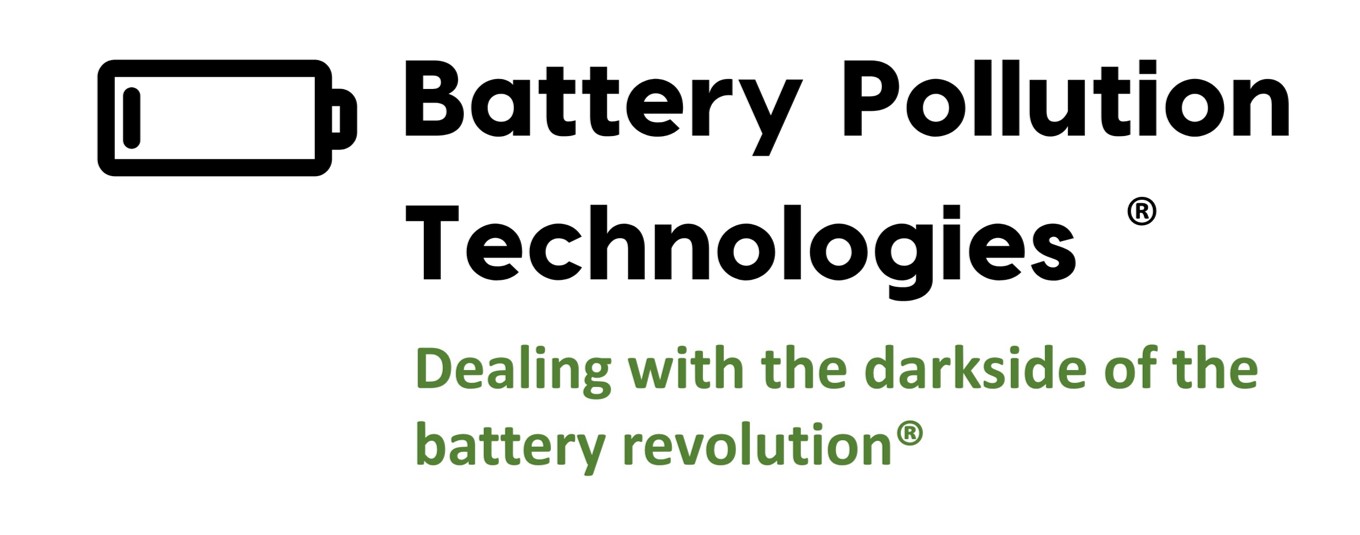Trending...
- The Law Offices of Steinhardt, Siskind and Lieberman, LLC Celebrates 35 Years
- LA's Rich & Successful Film Festival Celebrates Sold-Out Fourth Annual Edition
- "Women Beware Women" Brings the Best of Middleton to Madison
This partnership will support a series of coordinated initiatives including joint research into battery end-of-life issues in tropical climates and feasibility studies for establishing a battery recycling regional hub facility in Fiji to support all Pacific Nations in a "hub and spoke" operational framework.
SYDNEY & SUVA, Fiji - WisconsinEagle -- The University of the South Pacific (USP) and Australian start-up Battery Pollution Technologies (BPT) are pleased to announce an exclusive strategic collaboration aimed at addressing battery pollution, circular economy opportunities, and sustainable energy challenges in the Pacific Islands region.
This partnership will support a series of coordinated initiatives including joint research into battery end-of-life (EoL) issues in tropical climates and feasibility studies for establishing a battery recycling regional hub styled facility in Fiji.
It also includes the evaluation of second-life battery applications to extend the usable life of lithium-based energy systems.
The partnership follows on from the First Pacific Battery Briefing that was delivered by Sydney-based Battery Pollution Technologies to various Fijian Government Agencies in May 2025.
With battery usage surging across the Pacific – driven by electrification, renewable energy storage, and mobility – the environmental and logistical challenges of safe disposal and reuse are growing. The partnership seeks to generate practical, regionally adapted solutions that prioritise environmental integrity, economic development, commercial opportunity and energy resilience.
More on Wisconsin Eagle
Pacific Island countries face an urgent challenge in managing battery waste, driven by their geographic isolation, limited waste management infrastructure, and the vulnerability of their land and marine ecosystems.
Batteries power everything from mobile phones and solar lanterns in remote communities to electric vehicles and backup systems for island energy grids.
However, the presence of hazardous materials such as lithium, cobalt, and nickel poses significant environmental and safety risks if not properly managed.
Improper disposal can contaminate drinking water, damage coral reefs, and heighten ire hazards – especially in densely populated areas or during extreme weather events like cyclones.
As small island developing states, Pacific nations require practical, circular economy solutions that reduce dependency on imports, build local capabilities, and safeguard both the environment and cultural heritage.
For Fijian and Pacific communities, this is highly relevant as the use of batteries grows every year – from mobile phones & e-mobility scooters and bikes to the growing number of electric and hybrid vehicles.
Lithium batteries pose a unique challenge in end-of-life disposal due to their potential to catch ire, the presence of hazardous materials and the complexity of safely recycling and reusing valuable battery metals such as lithium, cobalt, copper and nickel.
"This partnership is a significant step forward in realising a circular battery economy for the Pacific," said Mansour Assaf, an Associate Professor at USP's School of Information Technology, Engineering, Mathematics and Physics (STEMP).
"By combining BPT's technical & commercial experience with USP's regional insight and research capabilities, we aim to build sustainable models that can be scaled across all island nations."
More on Wisconsin Eagle
"This is more than a research initiative," added Nicholas Assef, Founder & Managing Director of Battery Pollution Technologies.
"It's a commitment to innovation that delivers real environmental outcomes, the potential for investment, fit-for-purpose technology development and local education and employment opportunities."
"The Pacific is one of Earth's most beautiful regions, and the environmental impact of toxic end-of-life batteries in land and water needs to stop." Nicholas Assef concluded.
The collaboration will also encompass student research opportunities, policy engagement with Pacific regional governments and battery recycling capacity-building programmes across Pacific Island countries.
A critical and time-sensitive initiative will be the rapid establishment of structured internships at The University of the South Pacific, aimed at equipping students with hands-on experience in the fast-evolving battery ecosystem.
These internships will urgently address vital areas – battery diagnostics, second-life potential, materials recovery, data systems, and safe end-of-life disposal – accelerating the development of Fijian and Pacific Nations talent needed now to drive renewable energy efforts and circular economy outcomes across the region.
Battery Pollution Technologies and The University of the South Pacific have spent the past two years working closely to bring this initiative to life.
With momentum building, both parties are now eager to accelerate progress and deliver meaningful outcomes through this vital Trans-Pacific collaboration.
This partnership will support a series of coordinated initiatives including joint research into battery end-of-life (EoL) issues in tropical climates and feasibility studies for establishing a battery recycling regional hub styled facility in Fiji.
It also includes the evaluation of second-life battery applications to extend the usable life of lithium-based energy systems.
The partnership follows on from the First Pacific Battery Briefing that was delivered by Sydney-based Battery Pollution Technologies to various Fijian Government Agencies in May 2025.
With battery usage surging across the Pacific – driven by electrification, renewable energy storage, and mobility – the environmental and logistical challenges of safe disposal and reuse are growing. The partnership seeks to generate practical, regionally adapted solutions that prioritise environmental integrity, economic development, commercial opportunity and energy resilience.
More on Wisconsin Eagle
- 'The Unseen Chains': A New Mini Docu-Series Unmasks Early Signs of Domestic Abuse
- Vesica Health Granted PLA Billing Code for AssureMDx
- Newest Mako Smartrobotics™ System Used for First Time in the State Of Illinois for Total Joint Replacement Surgery
- $20 Million Annualized Revenue Projected from 20+ Acquisitions and Scaling of Top Quality Dental Labs Across Florida: Standard Dental Labs $TUTH
- Grok Wrote a Direct Message to Elon Musk Discussing Netverse & Phinge CEOs Challenge to Live Debate & Added "it'd be epic to see you two hash it out"
Pacific Island countries face an urgent challenge in managing battery waste, driven by their geographic isolation, limited waste management infrastructure, and the vulnerability of their land and marine ecosystems.
Batteries power everything from mobile phones and solar lanterns in remote communities to electric vehicles and backup systems for island energy grids.
However, the presence of hazardous materials such as lithium, cobalt, and nickel poses significant environmental and safety risks if not properly managed.
Improper disposal can contaminate drinking water, damage coral reefs, and heighten ire hazards – especially in densely populated areas or during extreme weather events like cyclones.
As small island developing states, Pacific nations require practical, circular economy solutions that reduce dependency on imports, build local capabilities, and safeguard both the environment and cultural heritage.
For Fijian and Pacific communities, this is highly relevant as the use of batteries grows every year – from mobile phones & e-mobility scooters and bikes to the growing number of electric and hybrid vehicles.
Lithium batteries pose a unique challenge in end-of-life disposal due to their potential to catch ire, the presence of hazardous materials and the complexity of safely recycling and reusing valuable battery metals such as lithium, cobalt, copper and nickel.
"This partnership is a significant step forward in realising a circular battery economy for the Pacific," said Mansour Assaf, an Associate Professor at USP's School of Information Technology, Engineering, Mathematics and Physics (STEMP).
"By combining BPT's technical & commercial experience with USP's regional insight and research capabilities, we aim to build sustainable models that can be scaled across all island nations."
More on Wisconsin Eagle
- Assent Recognized as a Leader in First-Ever Product Compliance Green Quadrant
- Tina Glasneck Launches New Romantasy, A Dragon's Queen, Blending Dragons, Fae Courts, and Forbidden Love
- Announcing the "Utsunomiya Gyoza Festival 2025" to be held November 1 and 2 in Utsunomiya City, Tochigi Pref, Japan
- TikTok to Stardom: Indie Artist StarArty203
- Locally Owned Company Brings Gasoline, Diesel & Car Washes Directly to Homes, Businesses, and Docks
"This is more than a research initiative," added Nicholas Assef, Founder & Managing Director of Battery Pollution Technologies.
"It's a commitment to innovation that delivers real environmental outcomes, the potential for investment, fit-for-purpose technology development and local education and employment opportunities."
"The Pacific is one of Earth's most beautiful regions, and the environmental impact of toxic end-of-life batteries in land and water needs to stop." Nicholas Assef concluded.
The collaboration will also encompass student research opportunities, policy engagement with Pacific regional governments and battery recycling capacity-building programmes across Pacific Island countries.
A critical and time-sensitive initiative will be the rapid establishment of structured internships at The University of the South Pacific, aimed at equipping students with hands-on experience in the fast-evolving battery ecosystem.
These internships will urgently address vital areas – battery diagnostics, second-life potential, materials recovery, data systems, and safe end-of-life disposal – accelerating the development of Fijian and Pacific Nations talent needed now to drive renewable energy efforts and circular economy outcomes across the region.
Battery Pollution Technologies and The University of the South Pacific have spent the past two years working closely to bring this initiative to life.
With momentum building, both parties are now eager to accelerate progress and deliver meaningful outcomes through this vital Trans-Pacific collaboration.
Source: Battery Pollution Technologies
0 Comments
Latest on Wisconsin Eagle
- Phoenix Advocacy Network Launches to Amplify Survivor Voices and Advance Disability Rights
- Matecrypt Platform Delivers Comprehensive Solution for Argentine Traders with 200+ Cryptocurrencies and 2 Million Orders Per Second Processing
- Wzzph Exchange Expands Brazilian Market Access with Comprehensive Trading Platform
- CCHR: Prescription Psychotropics Fuel America's Addiction and Overdose Crisis
- The Truth Behind Egypt's Stolen Legacy: Livestream
- Digital Pharma Advances 2026: AI and Patient-Centric Strategies Transform Pharma Marketing
- 'ChilCorp – Water' Builds Momentum After Being Named as a Qualified Team in $119M XPRIZE Water Scarcity Global Competition
- Cryptocurrency Exchange AZETHIO Targets US Market Security Concerns with MPC Technology and 15-Minute KYC Verification
- Gospel Sensation "Bible, Faith, Rembrandt aka BFR, They're Taking the World by Storm
- Durex Products Screen Media Suitable for U.S. FAST 41 Critical Minerals Mining Projects
- SQHWYD Launches Cognitive Finance Platform with Intelligent Trading Technology and Unified DeFi Access for Brazilian Market
- Southland Symphony Orchestra Season Opener – A Musical Mosaic
- Iguabit Unveils Comprehensive Platform Strategy for Brazilian Crypto Traders Seeking Regulated Solutions
- MoArk Dental & Implants Introduces Yomi Robotic Technology for Implant Surgery
- K-Drama Tours Expands Into K-Pop Experiences with New "K-Pop Demon Hunters" Tour in Seoul
- "Women Beware Women" Brings the Best of Middleton to Madison
- The World's No.1 Superstar™ Unveils Fall Lineup With the Re-Release of Holiday Classics
- Building A Business Website That Works In 2025
- The Law Offices of Steinhardt, Siskind and Lieberman, LLC Celebrates 35 Years
- University of Central Florida: "Psychiatry: An Industry of Death" Traveling Exhibit Educates Students on Mental Health Abuse

